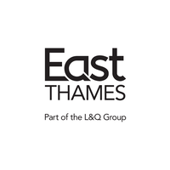Home » Client Stories » East Thames Group

In 2011, housing association East Thames Group (now part of the L&Q Group) had embarked on a transformation programme to reduce costs and improve efficiency. The Board and Group Executive realised that to sustain improvements deep changes in culture and leadership capability were necessary. But rather than run these as separate programmes the CEO and HR Director decided they should form part of the same solution.
Together with MJA, East Thames took the bold step to run a leadership programme for its entire cohort of senior managers driven by learning and experience not training or education, the 70+20, not the 10. Instead of teaching discrete leadership skills like strategic thinking and influencing, senior managers were given a wicked problem to solve: how to create a culture in East Thames that balances values of customer service and commerciality?
Putting the complex issue of culture change at the heart of the programme challenged the senior managers to intervene in their situation and make a positive difference. In contrast to conventional leadership programmes the starting point was organisational transformational not personal change. Individual development would be a consequence of, not a prelude to, leadership action.
The great advantage of classroom training of course is that the learning process can be structured and boxed. Objectives are set, sessions delivered in a variety of interesting formats, and learning outcomes distilled through opportunities for reflection. It is much harder to build a development structure around the rhythm of events and actions in the workplace.
Our solution to this dilemma was to design the learning process around the hero’s journey, an archetype from literature which lays out a pathway comprising five developmental stages. Each stage of the journey was supported by a set of development activities, including coaching, peer learning groups, and masterclasses. These sharpened the learning experience and served as a gateway to the next stage. The five stages combined to form the leadership programme.
During call to adventure, the senior managers were presented with the wicked problem, or in the language of the hero’s journey, the Holy Grail. During this first stage it dawned that current behaviours, mindset and leadership approaches were insufficient to overcome the challenges posed by the problem. Participants were coached through their resistance to acknowledge the need for change and to step out of their personal and organisational comfort zones.
In the second stage, crossing the threshold, the senior managers were invited to view their situation with fresh eyes, and open themselves to new possibilities. Conversations across internal business and professional silos, as well as expeditions to other organisations, were revelatory. Big assumptions were revealed and examined; new ideas explored and adapted.
The experiential journey of collaborative problem solving was punctuated by regular opportunities to step back from the organisational white water, to reflect on the currents of change, and decide how best to navigate next steps. Here in the belly of the whale senior managers were empowered to diagnose the East Thames culture and think and talk together about their shared vision for change.
On the road of trials, the senior managers ran experiments and projects which probed for weaknesses in the status quo. Here the group encountered, in metaphorical terms, the troll under the bridge, obstacles and difficulties to be overcome if their quest was to be accomplished.
During the concluding phase, return with the prize, the senior managers shared the results from their quest and presented moving stories of personal transformation. The leadership programme did not of itself solve the wicked problem of culture change in East Thames. But in recognising that leadership development is most effective when learning about leadership is connected to the act of leading, the programme created a strong and sustainable container for individual and organisational change in East Thames. Senior managers now understood that leadership is something you do not something you learn.
For more see Mark’s paper, Learning by Leading (opens in new window) in the International Journal of Leadership in Public Services.










Enter your email here to receive ideas and insights from MJA